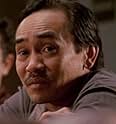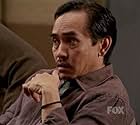Añade un argumento en tu idiomaA jury of 12 different men and women deliberating various capital crime cases while under the supervision of the courthouse staff ranging from the bailiff, the head clerk, the messenger, and... Leer todoA jury of 12 different men and women deliberating various capital crime cases while under the supervision of the courthouse staff ranging from the bailiff, the head clerk, the messenger, and the judge, prosecutor and defense lawyer.A jury of 12 different men and women deliberating various capital crime cases while under the supervision of the courthouse staff ranging from the bailiff, the head clerk, the messenger, and the judge, prosecutor and defense lawyer.
- Premios
- 1 premio en total
Explorar episodios
Imágenes
Argumento
¿Sabías que...?
- CuriosidadesThe judge in the first season was supposed to be played by Sidney Lumet, director of 12 hombres sin piedad (1957). When Lumet got injured falling on some ice, Barry Levinson, producer and director of the show, stepped in to play the role. Levinson acts in the first twelve episodes.
Reseña destacada
I missed the first couple of episodes but was nevertheless immediately caught up in this series. While other shows focus on the cops and crime scene investigators who solve the cases and the district attorneys prosecuting the criminals, it's refreshing to see one that focuses on the jury; after all justice isn't served when the lab results come back and they are basically the final arbitrators of justice. Each episode starts with the jury starting deliberations with flashbacks employed to show us the trial; the actual events of what happened, whether or not the defendants are guilty are shown to the viewers at the end of the episode.
Although I was intrigued by the concept, I was initially hesitant about this show because the "jury" changes each week; I like watching "Law & Order" or "CSI", but the quality of the guest stars are sometimes atrocious and can really affect the dramatic impact of an episode. Luckily, "The Jury" has so far seemed to avoid that sand trap. The actors playing the jury for the most part are very good- not great- but their not bad(and surprisingly recognizable from guest-starring roles on other shows). The actors playing the attorneys and court staff don't fare so well, though. Adam Busch is the comic relief and is quite adorable and funny, but his character seems out of place in a serious courtroom drama and I have no idea what his character's job is; the flirtation between him and Cote de Pablo's character is awkward (intentionally?). The judge (I can't remember his name) is okay but you can why he's not an actor. Anna Friel, a British actress, and Jeff Hephner take some getting used to but they become more likable each week. There are several more actors playing lawyers but the episodes showcasing them have not aired yet.
The acting of the may not be the greatest. But watching the jury deliberate is riveting as they and the viewer try to weave through the evidence, trying to determine the truth of the case. The dialogue is realistic abounding with the lame jokes, bad grammar, and banter of average folks stuck together for hours. The jurors always disagree about something and that's when the show gets really exciting, when two or more jurors give us their different perspectives of what they think happened, showing how "evidence" can always be interpreted in myriad ways and how difficult it is for real juries to come to a decision given that fact.
Some may argue that showing what really happens at the end of the show ruins the naturalness of it, since real juries never know the guilt or non-guilt of the defendants neither should the viewers. While that's true, I still feel it's a good idea, after going through the roller-coaster ride of emotions and ideas of a jury deliberation, finding out the true guilt or innocence of a defendant brings a certain sense of closure and emotional catharsis of relief or sadness when the viewer sees what really happened compared to the defendant's ultimate fate. Sometimes the defendants get away with murder and sometimes an innocent man is imprisoned; the show reenforces the fact that the court system isn't always right and that justice is a truly human creation.
Although I was intrigued by the concept, I was initially hesitant about this show because the "jury" changes each week; I like watching "Law & Order" or "CSI", but the quality of the guest stars are sometimes atrocious and can really affect the dramatic impact of an episode. Luckily, "The Jury" has so far seemed to avoid that sand trap. The actors playing the jury for the most part are very good- not great- but their not bad(and surprisingly recognizable from guest-starring roles on other shows). The actors playing the attorneys and court staff don't fare so well, though. Adam Busch is the comic relief and is quite adorable and funny, but his character seems out of place in a serious courtroom drama and I have no idea what his character's job is; the flirtation between him and Cote de Pablo's character is awkward (intentionally?). The judge (I can't remember his name) is okay but you can why he's not an actor. Anna Friel, a British actress, and Jeff Hephner take some getting used to but they become more likable each week. There are several more actors playing lawyers but the episodes showcasing them have not aired yet.
The acting of the may not be the greatest. But watching the jury deliberate is riveting as they and the viewer try to weave through the evidence, trying to determine the truth of the case. The dialogue is realistic abounding with the lame jokes, bad grammar, and banter of average folks stuck together for hours. The jurors always disagree about something and that's when the show gets really exciting, when two or more jurors give us their different perspectives of what they think happened, showing how "evidence" can always be interpreted in myriad ways and how difficult it is for real juries to come to a decision given that fact.
Some may argue that showing what really happens at the end of the show ruins the naturalness of it, since real juries never know the guilt or non-guilt of the defendants neither should the viewers. While that's true, I still feel it's a good idea, after going through the roller-coaster ride of emotions and ideas of a jury deliberation, finding out the true guilt or innocence of a defendant brings a certain sense of closure and emotional catharsis of relief or sadness when the viewer sees what really happened compared to the defendant's ultimate fate. Sometimes the defendants get away with murder and sometimes an innocent man is imprisoned; the show reenforces the fact that the court system isn't always right and that justice is a truly human creation.
- kcla
- 1 jul 2004
- Enlace permanente
Selecciones populares
Inicia sesión para calificar y añadir a tu lista para recibir recomendaciones personalizadas
- How many seasons does The Jury have?Con tecnología de Alexa
Detalles
Contribuir a esta página
Sugerir un cambio o añadir el contenido que falta

Principal laguna de datos
By what name was The Jury (2004) officially released in Canada in English?
Responde



















